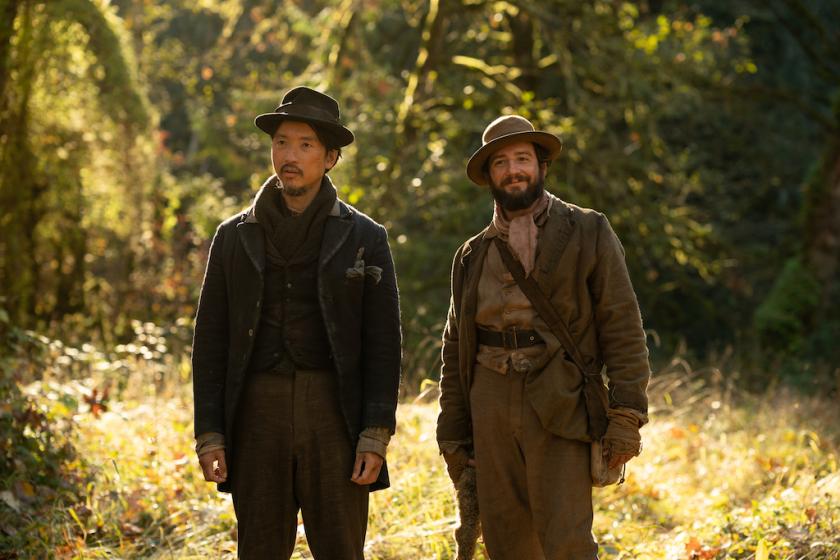Kelly Reichardt is one of America’s most distinctive directors, whose meticulously detailed, character and place-driven dramas have a lowkey vibe that belies their impact. Not many directors could make a yarn about a couple of baking entrepreneurs whose only crime is to milk someone else’s cow, which is as gripping, moving, and ceaselessly fascinating as this.
First Cow returns Reichardt to the frontier milieu of her Meek’s Cutoff in 2010. That film involved Old West settlers who lose their way on the Oregon Trail; her protagonists here have reached a destination of sorts, a godforsaken trading post in Oregon Territory in the 1820s, where they hope that after years of drifting they may start to make a life for themselves.
 Cookie (John Magaro, pictured right) is a mild-mannered, introverted soul, an orphan who’s been on the move his whole life. As the film opens, he’s the much-maligned cook for a curmudgeonly band of fur trappers travelling through a forest . One evening while foraging for food, Cookie spies King-Lu (Orion Lee) hiding naked in the bushes, on the run from some Russians out for his blood. He’s less surprised by a naked man in the middle of nowhere, than by the fact he’s Chinese. “Everyone’s here,” smiles King-Lu. “We all want that soft gold.”
Cookie (John Magaro, pictured right) is a mild-mannered, introverted soul, an orphan who’s been on the move his whole life. As the film opens, he’s the much-maligned cook for a curmudgeonly band of fur trappers travelling through a forest . One evening while foraging for food, Cookie spies King-Lu (Orion Lee) hiding naked in the bushes, on the run from some Russians out for his blood. He’s less surprised by a naked man in the middle of nowhere, than by the fact he’s Chinese. “Everyone’s here,” smiles King-Lu. “We all want that soft gold.”
They part company, later reuniting at the trading post where Cookie has been dumped by his employers and the smooth-talking King-Lu – who’s something of an amiable chancer – has shaken off his pursuers, and found himself some clothes and a ramshackle home. Cookie moves in, they become friends and, quickly, business partners.
This is a strange, improvised, down-at-heel place, a melting pot of races and traders, gamblers and grifters, dealing in currency that seems to have been newly scribbled, or hacked from any old metal that’s lying around. As King-Lu, who’s travelled the world between his home in China and this pitiful place, observes: “history isn’t here yet.”
But it’s here that the pair spy opportunity. When the first cow in the territory is led into town, it brings an ingredient that’s missing from everyone’s culinary experience: milk. With the help of some nocturnal and clandestine milking, the skilled Cookie is soon baking biscuits and cakes that drive the community wild. Business booms. Rather than buy the milk they need, they keep on stealing. So it becomes problematic, to say the least, when the cow’s owner, the powerful chief factor (Toby Jones), becomes one of their most enthusiastic new customers.
The source of the story, Jonathan Raymond’s novel The Half-Life, moves between Oregon and China, and spans two centuries. Adapting it, Reichardt and Raymond himself focus on this one moment, and a casual, hardly harmful con which, in an environment where a man can get shot for a misplaced comment, puts our likeable, unlikely heroes in peril.
It’s a simple scenario, almost whimsical, but sharply scripted and enriched by Reichardt’s idiosyncratic, compelling ability to create character and place and William Tyler’s lyrical soundtrack. The result is a melancholy, rather beautiful account of friendship, and a reflection on the correlations between America’s burgeoning commercial instinct and its cultural melting pot. 
The production design is marvellously evocative, as is the language of this melting pot, whether it’s the Chinaman’s negotiation with a native Indian for a canoe ride, or the colourful banter over card games in which Ewen Bremner, as the factor’s foreman Lloyd, brings his inimitable verbal vigour. The script also adds some off-the-wall mirth. “Cribbage players are in short supply in this hemisphere,” observes one of the factor’s henchmen. “Aye, I suffer fer it daily,” comes Lloyd’s heartfelt reply.
Magalo and Lee create a lovely chalk-and-cheese bond, as the quiet master baker and his voluble salesman. And Jones (pictured above, right) is reliably menacing as the trader whose pathetic social pretention – he’s laughably eager to impress his guest with a clafoutis – conceals a deeply nasty approach to business.
First Cow joins two, very different pantheons. Reichardt’s approach has the authenticity and calibre of such revisionist westerns as Altman’s McCabe and Mrs Miller, Jarmusch’s Dead Man (whose Gary Farmer is amongst her supporting cast), and HBO’s landmark series Deadwood. At the same time, the delightful depiction of characters bringing tasty treats to a gobsmacked clientele merits a place amongst the great foodie films – Babette’s Feast, Tampopo, Big Night. When Jones sighs, “I taste London in this cake”, it certainly makes one want a bite.















Add comment